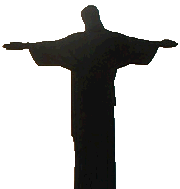07/26/2004: "Question of the Day: What are the Gnostic Gospels?"
NOTE: If you'd like to submit a question, either post it as a comment in this entry or e-mail me at questions at thecrawfordfamily dot net.
Today's question comes from John, who asked for more details on the Gnostic Gospels after my question of the day on Thursday. The full text of his question (as always I edit for title space) can be found in the comment section of Thursday's question of the day.
The term Gnostic Gospels isn't as specific as one would like. In general it refers to any Gospel (the story of Christ's life) that was written by a Gnostic. A Gnostic is someone who believes in a secret set of knowledge or Gnosis that is the key to salvation. People who knew this knowledge would be saved, other's would not. That's an oversimplification, but good enough for the point of this answer.
What is generally considered the Gnostic Gospels these days are the writings discovered in the 60's in northern Africa I believe. A monestary had an extensive collection of old manuscripts dating back to the 3rd century that included a number of non-canonical (i.e. books that are not in the Catholic Bible) books. These include the Gospels of Thomas, Phillip, and Mary (referring to Mary Magdalene) which are often referred to in the context of being Gnostic Gospels.
It is important to note that while the Gospels that are in the Catholic Bible are generally believed to be written by the author titled (the Gospel of Mark was actually written by Mark, etc.) or at least finished by their close followers shortly after their death, the same can not be said of the majority of other Gospels. Most of them are thought to have been written by others in the 2nd and 3rd century well after the stated authors had died. As this seems to suggest, these other Gospels can be said to be written, at least in the technical sense of the term, by Gnostics (those who had secret knowledge passed down from the stated author).
Along these lines, many are surprised to hear that these discovered Gnostic Gospels were not a surprise to find. The Catholic Church and many historians knew they existed, although they may not have had the text of it in many cases. There are many references by early Church father's to these works and that knowledge was not lost over time. What was interesting about the discovery of the manuscripts in the 60's is that we now had the text for some documents that had been lost and, as with the Dead Sea Scrolls, a new manuscript to check existing copies against for accuracy and different "editions".
To finish off answering John's question, I don't know a whole lot about what the Gnostic Gospels say, but mostly it is a lot of the same stuff you'd see in the Canonical Gospels. There are new stories and parables here and there and some differences in how the Passion plays out (similar to how they play out slightly differently in the Canonical Gospels) but overall, from what I understand, nothing remarkable.
What can make them remarkable is that these few differences between them and the Canonical Gospels can be said to be information that the Catholic Church has hidden. Some will take those changes/additions and scrutinize them to find the hidden message within the Gnostic Gospels. This is the root of what is referred to as neo-Gnosticism.
As to how we should approach them as Orthodox Christians (and by that I mean Christians who hold to what has traditionally been called Christianity), we should recognize how valuable every piece of written information from the early Church is. I've always been a big fan of reading books that disagree with my viewpoint. I'm in the middle of reading the book of mormon to understand the mormons and to get an insight into how they think. The same can be said of the Gnostic Gospels. They are written by a people who had a significant impact on the early Christian movements. To understand the people of the time will give us better insight into the Canonical Gospels and the points they were trying to make.
In the end, however, it must be remember that from the Catholic Church's perspective, these Gospels are not the Word of God. They are merely books, books that cronicle the same events as the Canonical Gospels that are believed by most Christians to be the Authoritative Word of God.
Thanks again for your question John.

